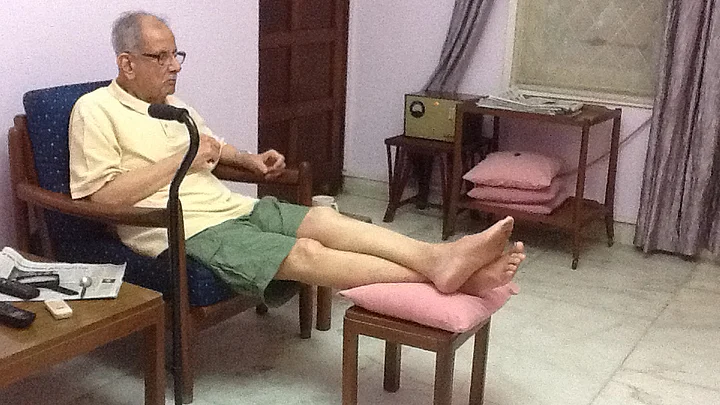My father, whom we call Anna, moved into a new flat on May 9, 2015.
Since the move, Anna has been unhappy and very disoriented. He has asked that he be moved to a hotel. He has stated many times that he feels abandoned. His walking has reduced and sleep increased.
My visits with him have become longer, hoping that I will be able to cheer him up. We discuss politics and the weather. I plan meals with more variety. Add more sweet things to his diet, especially cold melon and chocolates. But all this hasn’t helped much.
Of the Affinity Between Memory and Word
One of the evenings after his move, I persuaded him to walk in a small brown patch behind his flat (I am yet to find a gardener who can convert it to a green area). After a short walk, we both sat on a bench and chatted about the weather.
Suddenly he says, “Pass your palm over my hand.”
I am not sure what he is thinking, but like any obedient daughter, I do as he asks.
I move my palm over his overturned hand, from the tip of his fingers to his forearm. Not once but twice.
Anna gives me a sideways glance and asks, “What does it feel like?”
I am confused. It feels like the hand of an old person – thin skin, a little rough with wrinkles, dry, and smaller than my hand.
So I say, “Like your hand”.
Duh! The shimmering beacon of my intelligence knows no bounds!
He looks at me and says, “No. It feels like a corrugated sheet”
I look at his hand, veins and bones standing out, and realise that it is indeed the perfect term to use.
(After working in corporate India for over 29 years, Sangeeta has taken time off to look after her father, who was diagnosed with Parkinson’s Disease in 2008. Sangeeta hopes that these authentic stories will help patients and caregivers understand and appreciate the impact of Parkinson’s Disease. You can follow Sangeeta’s blog here.)
(At The Quint, we question everything. Play an active role in shaping our journalism by becoming a member today.)
